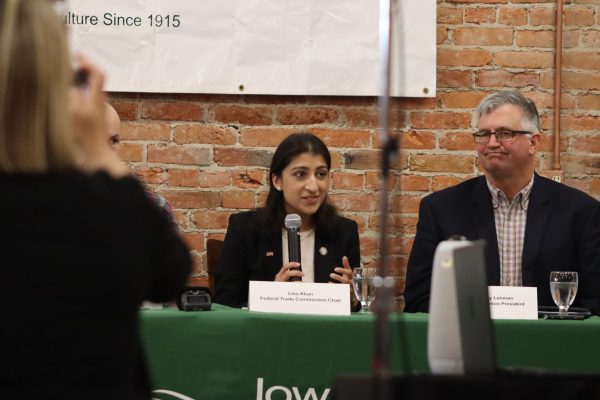Iowa State Faculty Senate meets Tuesday to discuss critical changes
The Faculty Senate hosts a meeting April 23, 2019, in the Sun Room of the Memorial Union. Senate members discuss the workday update, annual promotion and the tenure report.
December 7, 2020
The Iowa State University Faculty Senate will meet for their sixth meeting of the year Tuesday to discuss several minor proposals and an improved diversity program with hope to clearly define diversity and explain what their course will be about.
The Faculty Senate represents the general faculty of Iowa State University and participates in shared governance of the university with the administration. It is made up of 82 representatives elected by the general faculty and divided into caucuses representing each of the seven colleges.
The Faculty Senate has legislative responsibility for general academic and educational policy, serving to facilitate communication among faculty, students and administration. It also cooperates with the administration in conflict resolution and advises the administration on budgetary and other policy matters.
The agenda for the meeting consists of a department name change (Sociology and Criminal Justice) up for a vote. There is also a proposition to add two new minor programs — beverage management and ethics.
The beverage management minor, if passed, would fall under the hospitality management program. Since 2016, the beverage market volume has grown to over 53 billion gallons, with the largest segments being spirits, wine and beer, as well as coffee and soft drinks.
If passed, the ethics minor proposal would be part of the philosophy and religion department.
Ethics is the branch of human thought that addresses questions of human morality. It seeks to define right and wrong at the theoretical level and to guide action across diverse fields of practice.
An ethics minor will provide opportunities for students to develop an understanding of both the theoretical foundations and the practical applications of ethics. It will serve students who wish to understand how ethical thought complements their chosen majors, but also students who have an interest in learning about ethics more generally.
The ethics minor will help students from across the university to sharpen their critical thinking abilities, develop writing and communication skills and infuse ethical perspectives into their studies. It will provide a way for graduates to signal their skills and understanding of ethics to employers and graduate or professional schools.
The Senate will also work to make changes to the Iowa State Diversity Program. The Diversity Course proposal hopes to clearly define diversity and explain what their course will be about and how it will satisfy the four learning outcomes.

















